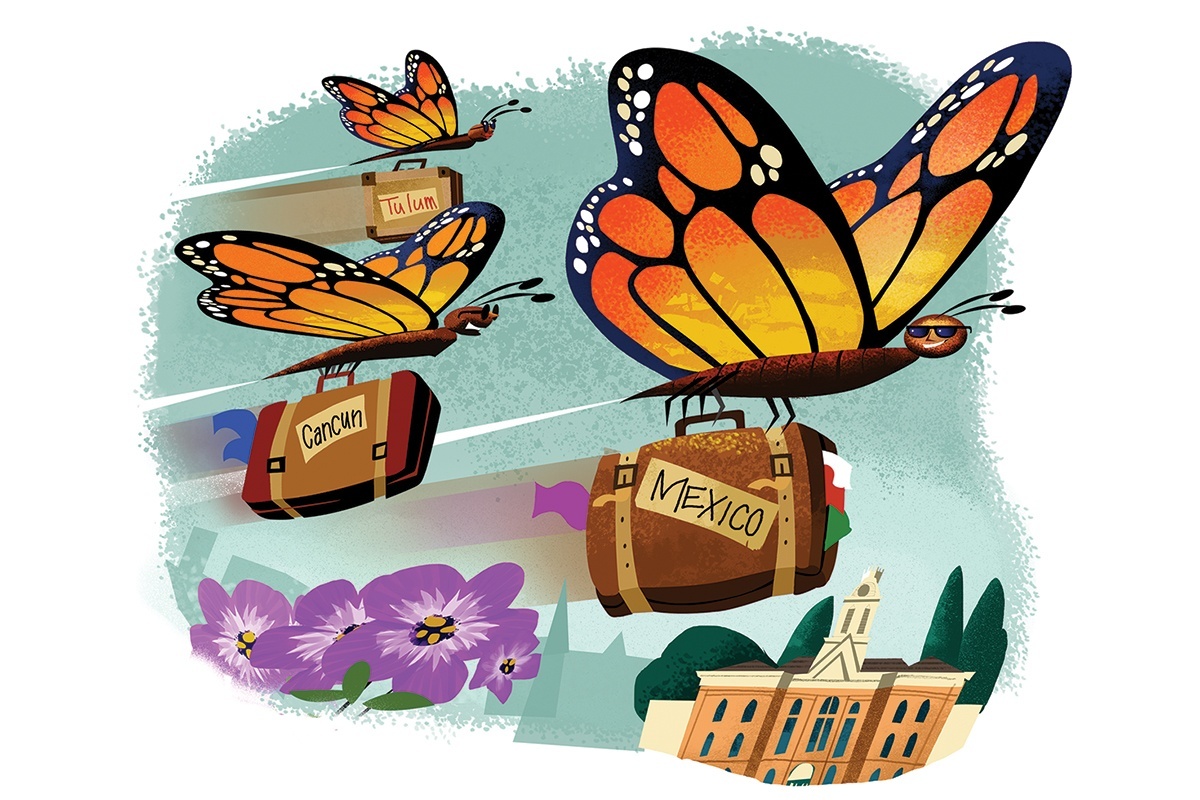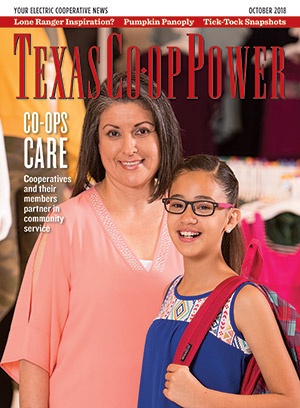Ole Ringness knew he was on to something when he invented the disc plow and disc harrow in Texas nearly 150 years ago. Monarchs and their relentless migration to Mexico are worth celebrating, as the folks in Jasper do. And do you know about the first high-five?
Plow Know-How
This month marks the 175th anniversary of the birth of Ole Ringness in Norway. Ringness, a mail carrier after his family settled in Bosque County, invented the disc plow and disc harrow after noticing how a warped wheel on his wagon moved large amounts of mud.
He made models of a disc plow in his father’s blacksmith shop but never had his invention patented. In July 1872, as he journeyed to Washington, D.C., to present his case for a patent, he died under mysterious circumstances. Ringness apparently had reached the patent office because it later contacted his family to say his patent had been approved and would be granted upon payment of a fee. The family declined the offer, so Ringness never received credit for the invention.
Similar farm equipment was later patented by a plow company.
Did You Know?
As cotton harvest continues in Texas, it’s a good time to note that Eli Whitney applied for a patent on the cotton gin 225 years ago—October 28, 1793. He was granted the patent in March 1794. Texas, which leads the nation in cotton farming, produced $1.62 billion in cotton and cottonseed in 2017.
Monarchs Rule the Day
Jasper has hosted a fall festival for more than 40 years, but recently the event has morphed into a celebration of the annual monarch butterfly migration through East Texas. The alliance between butterflies and the community was cemented in 2015 when Gov. Greg Abbott signed a resolution designating Jasper the Butterfly Capital of Texas.
Though millions of monarchs will fly through East Texas en route to their winter grounds in Central Mexico, their numbers have dropped from a billion in their heyday to about 33 million in 2014—or more than 80 percent since the mid-1990s, according to the U.S. Fish and Wildlife Service. All the more reason to pay attention to these beautiful insects.
So on October 20, people and butterflies are welcomed on the Jasper County Courthouse square for the Fall Butterfly Festival. In addition to arts and crafts, food vendors and live entertainment, monarch education will be the order of the day.

Monarch butterflies migrating through Texas are nearing the end of their 3,000-mile journey.
David Moore
Up in Arms
Americans John Carlos and Tommie Smith, who was born in Clarksville, sparked a controversy 50 years ago and created one of the most iconic sports images of the 20th century at the Olympic Games in Mexico City. During the medal ceremony after the 200-meter sprint October 16, 1968, Smith, who won gold, and Carlos, who won bronze, raised black-gloved fists in a black power salute.
“As the anthem began and the crowd saw us raise our fists, the stadium became eerily quiet,” Carlos later wrote. “There’s something awful about hearing 50,000 people go silent, like being in the eye of a hurricane.”
Then the crowd began to boo them, and some started screaming—not singing—the national anthem. Within days, Smith and Carlos were suspended by the U.S. Olympic Committee.
Other athletes with Texas connections won gold medals at the Mexico City games:
George Foreman of Marshall, heavyweight boxing.
Randy Matson of Kilgore and a star at Texas A&M University, shotput.
Felipe Muñoz, who swam for the University of Texas, 200-meter breaststroke. He became Mexico’s first-ever Olympic gold medalist in swimming.
Doug Russell, who attended the University of Texas at Arlington, in the 100-meter butterfly, upsetting Mark Spitz. He also won gold in a relay race.
Up for Discussion
Raise your hand if you know the significance of the Astros’ last game of the season 41 years ago. Hopefully somebody will come along and high-five you.
The celebratory gesture is said to have started in Los Angeles at that game, October 2, 1977, when Dusty Baker of the Dodgers homered off Houston pitcher J.R. Richard. Teammate Glenn Burke raised his hand to greet Baker as he touched home plate, and Baker reached up and slapped Burke’s hand. That is believed to be the first high-five.
Others say the University of Louisville basketball team invented the high-five during the 1978–79 season. Either way, the high-five endures, right alongside chest bumps and fist bumps.
Anticipating Power Line Problems
Bluebonnet Electric Cooperative’s control center recently dispatched a crew to replace a faulty clamp on a section of electric line along a remote road. No one reported a power outage, but the co-op knew about the clamp thanks to a new monitoring technology called distribution fault anticipation.
Falling limbs and switch arcing cause measurable changes in line current and voltage. DFA detects and reports such changes, allowing co-ops to find and fix these situations before they cause problems, including wildfires. Power line events caused more than 4,000 wildfires in Texas in one three-year period alone, according to the Texas A&M Forest Service.
Texas A&M engineers developed DFA, and Bluebonnet and Pedernales ECs and Mid-South Synergy participated in a multiyear demonstration of the technology. Bluebonnet now has DFA devices on 24 feeder lines.
“This technology helps us increase safety and reliability,” says Will Holford, Bluebonnet EC manager of public affairs. “If we had not known about that clamp that needed to be replaced, the consequences could have been significant. We’re always looking for ways to improve the health of our feeders and mitigate the threat of wildfires.”
Don’t Mess With Texas Chicks
Two chicks from Texas were among 10 finalists earlier this year in Purina Animal Nutrition’s national contest to name the Strongest Chick in America. Jennifer Lampkin from Big Sandy and Laura Vaile Gariner from Hockley entered photos of their chicks, and voting on Facebook earned them a spot among the finalists. A chick from Michigan named Rosaleen won the contest.
Almanac
125 years ago: Suffragist and civil rights activist Christia V. Daniels Adair was born October 22, 1893, in Victoria. In 1944, she was among the first black women to vote in the state’s previously all-white primary.
Worth Repeating
“The people love their co-ops, and they stay close to it just like a community.”—State Sen. Robert Nichols of Jacksonville, during a Senate Committee on Business and Commerce hearing in May about the electric utility industry; October is National Cooperative Month.


